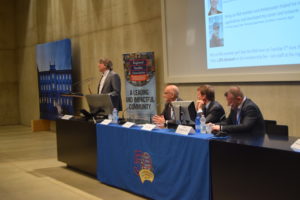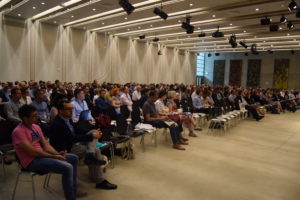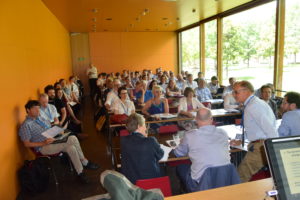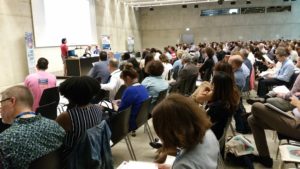Report on the RSA Annual Conference 2018: Labour Mobility, Capital and Knowledge in an Age of Global Reversal and Regional Revival

Report on the RSA Annual Conference 2018 – A World of Flows: Labour Mobility, Capital and Knowledge in an Age of Global Reversal and Regional Revival
By Javier Diaz Bay, University of Buenos Aires, Argentina
The RSA Annual Conference 2018 – A World of Flows: Labour Mobility, Capital and Knowledge in an Age of Global Reversal and Regional Revival, was held at Università della Svizzera Italiana, Lugano, Switzerland between 3rd and 6th of June 2018.
More and more voices are discussing the advantages and disadvantages of globalization. This year’s RSA Annual Conference was focused on how to address processes of global reversal and regional revival, in a world dominated by flows of capital, labor, and knowledge.

In such times, we need to better understand the nature and fabric of a footloose world. We know that transport and communication technologies continue to drive globalization, information is ubiquitous, and the data deluge is ever-growing, while at the same time economically valuable knowledge continues to be sticky. On the other hand, production factors remain highly mobile and this mobility is expressed in ways that are often unexpected.
A growing dialogue between researchers, interaction between their research results and its monitoring and a shared communication of proposed solutions are key elements in the search for solutions to understand this world of global flows. With this framework in mind, the conference served as a much needed platform for stimulating scientific debates, exchanges with policy makers and exciting discussions about this pressing topic.

The conference was held in the beautiful city of Lugano in Canton Ticino, the Italian-speaking region in southern Switzerland, Lugano is not only Switzerland’s third most important financial Centre and an outstanding conference and business centre, but also a town of parks and flowers, a wonderful lake, villas and churches. The conference was hosted by the Università della Svizzera Italiana and took place in the USI Lugano Campus, in a historic and beautiful building, close to the Lugano city centre and lakeside. This privileged environment welcomed attendees from Saturday, June 2, when the first delegations arrived to the city and on Sunday, when the inaugural walking tour was held.
The walking tour was followed by a welcome reception held at the City Council Courtyard of the Palazzo Civico, where the participants were greeted by the Mayor of Lugano, Marco Borradori and the Prof. Rico Maggi from USI University. This was the perfect starting point for a growing sense of camaraderie that developed through the course of the conference, as drinks and nibbles provided the perfect medium through which to fraternize with attendees who had arrived from all over the world. Professors, researchers, students and academics from as far away as the United Kingdom, China, Mexico, Estonia, Poland, Brazil and Argentina, among other countries, also unlike some conferences, the local population was well represented and joined this pleasant event, making contacts and conversation.
The academic conference was opened by a plenary session, which included two challenging and current research topics: “Refugee Migration in Europe” presented by Alessandra Faggian from Gran Sasso Science Institute, Italy and “National Urban Plans and the Rediscovery of Regional Planning in the Global South” by Seth Schindler from University of Manchester, UK. The illegal, illicit and new geographies of uneven development dominated the second plenary session of the day, where Prof. Ray Hudson from University of Durham (UK) reflected on the significance of illegality in the economies of ‘successful’ cities and regions in the Global North and South, but with particular consideration to its role in ‘marginalised’ places.
EU Cohesion Policy was the core topic of Policy Tuesday’s plenary panel, in which Lewis Dijkstra from EU Commission acted as chair, with lectures from scholars and policy makers from the Organisation for Economic Co-operation and Development (OECD) France, Switzerland and the European Policy Research Centre and London School of Economics (UK).

A very interesting session for me, was the sponsored session on Cross-Border Metropolitan Regions. In which, the Swiss Knowledge Network for Spatial Development and Policy promoted a research agenda to identify opportunities and challenges facing cross-border metropolitan regions and discussed in a policy panel their evidence of the expectations, aspirations, fears, perspectives and strategies of decision-makers in cross-border metropolitan regions. I also found the Student and Early Career Session, chaired by Susanne Frick (LSE), provided a useful forum for discussing careers in regional research and was greatly enhanced by the presence of young professionals, and representatives of think tanks, NGO’s and the private sector, who provided an invaluable insight into their work and opportunities for academics.
The highlight of the second evening was the Gala Dinner, which took place at the wonderful Palazzo dei Congressi. At the dinner, Ron Martin, President of RSA presented the Best Conference Student Paper Award to Kevin Walsh and Best Conference Paper Award to Randolph Luca Bruno.
On the final day, interesting panels and sessions took place in which a wide range of crucial issues for regional science and practice took place on topics such as labour market, social capital and democratic engagement and new workplaces. Finally, a very interesting closing plenary focused on “special economic zones in emerging countries” and “the allocation of risk and uncertainty in infrastructure investment”. It was a perfect closing for a conference that highlighted the importance of the regional issue at a dynamic at a challenging time and brought together theorists and policymakers from across the world.

To conclude my report, I would like to present a personal opinion about the Regional Studies Association’s Annual Conference. I have been a member of the RSA for five years and this is my second conference. The first conference I attended was at Fortaleza in Brazil and this year’s conference was the first I have had the opportunity to attend in Europe. I believe that this conference has developed over the last five years and truly shows the strength of the Regional Studies Association as an international organization. The number of sessions, students, professors and policymakers who gathered in Lugano demonstrates an increasing global demand for regional knowledge and cements the RSA’s position as an important node in this global network.
The RSA Annual Conference 2019 will be held in Santiago de Compostela in Galicia a an autonomous community in Spain’s northwest in 2019 on the theme – Pushing Regions beyond their Borders. We hope to see you there!